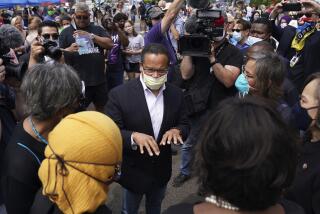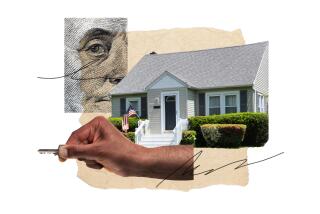VIEWPOINTS : Blacks Return to Self-Help Concept : Civil Rights Groups Shift Strategy as Administration Reduces Social Programs
- Share via
Alarmed at the growing number of black poor and the increasing reluctance of Washington to help, black leaders have rushed to advocate more economic self-help programs.
The most recent National Assn. for the Advancement of Colored People and Urban League conventions brought forth appeals for blacks to initiate “buy black” campaigns, “black dollar days,” “freedom buy” clubs and “economic self-development” plans.
The self-help emphasis marks a dramatic turnaround. During the 1960s and 1970s, civil rights groups roundly condemned self-help advocacy as an archaic retreat from the goal of equal opportunity, civil rights and political parity.
Worse, these detractors viewed economic self-help programs as little more than an attempt to revive the ideas of Booker T. Washington.
Washington, a prominent educator who founded Tuskegee University in the 1880s, argued that blacks should start businesses and economic improvement associations.
Political rights and social legislation, Washington felt, should take a back seat to building black wealth.
In 1900, Washington organized the National Negro Business League. The goal was racial uplift “through thrift, industry and Christian morality.” Washington’s “bootstrap” example inspired blacks to start dozens of business and professional organizations, particularly in the South.
Washington’s greatest opposition, ironically, came from the NAACP. As the civil rights movement over the years gained steam, Washington’s program was forgotten.
But times have changed. Black leaders know that the Reagan Administration will not increase spending on social programs, nor lessen its hostility to affirmative action.
The federal government is no longer the dependable ally that blacks grew accustomed to having under past Democratic administrations.
Black leaders also are buoyed by the new-found prosperity of the emerging black middle class. A 1986 Commerce Department report, “We, the Black Americans,” notes that blacks are living longer, holding better jobs and owning houses in greater numbers.
According to the report, the number of black high school graduates jumped 26% between 1970 and 1983. In addition, 44% of the blacks surveyed were living in houses they owned or were buying, and the number of black professionals more than doubled.
Black business has also grown in importance.
Last summer’s annual business survey by Black Enterprise magazine found that the nation’s top 100 black enterprises overall had sales that grew 14.8% in 1985 to $2.9 billion.
The growth rate for these businesses has handily exceeded that of the Fortune 500 companies.
The economic gains blacks have made translate into an enormous increase in black purchasing power.
Operation PUSH and Urban League estimates place the amount of dollars black consumers spend on goods and services in excess of $150 billion yearly.
Black leaders reason that substantial numbers of blacks for the first time are in a position to do more for the 9.5 million blacks officially classified as poor.
Middle-class blacks, they insist, have the background and resources to promote businesses, education programs, community centers and an array of other improvement efforts that don’t depend on the government for funding.
To prove that economic self-help can work, black leaders frequently cite the experience of other ethnics who overcame poverty and discrimination without special federal programs and civil rights laws.
The Irish and Italians set up well-connected political machines in Boston, Philadelphia and New York that gave them some control in the allocation of construction jobs, city services, City Hall patronage and public education.
The Japanese invested in farmland and small businesses. The Chinese found success in light industries such as canning, the garment trade, cigar wrapping and the laundry and restaurant businesses.
Jewish immigrants carved out prominent niches in business and education despite facing severe quotas at colleges and in many industries.
Black leaders are certainly right in pointing to the progress of other ethnic groups.
They represent a healthy model for blacks because the dollars the immigrants gave to their businesses and organizations ultimately found their way back into community improvement programs.
However, black leaders wisely have not gone overboard and attributed magical powers to the economic self-help approach.
It is only one of many strategies that blacks can use to combat the problems of crime, welfare dependence, poor education and poverty.
Blacks did not create the myriad ills of the ghetto, but as black leaders seem to be saying, they can and must do more to help solve them.
More to Read
Get the L.A. Times Politics newsletter
Deeply reported insights into legislation, politics and policy from Sacramento, Washington and beyond. In your inbox twice per week.
You may occasionally receive promotional content from the Los Angeles Times.










